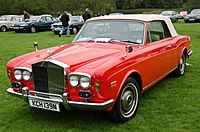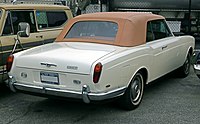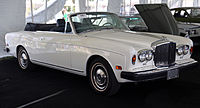Rolls-Royce Corniche (original) (raw)
From Wikipedia, the free encyclopedia
Motor vehicle
| Rolls-Royce Corniche | |
|---|---|
 1986 Rolls-Royce Corniche II 1986 Rolls-Royce Corniche II |
|
| Overview | |
| Manufacturer | Rolls-Royce Ltd (defunct 1973)Rolls-Royce Motors |
| Production | 1971–1995 (6,823 produced)6,262 produced (Rolls-Royce)561 produced (Bentley) |
| Designer | Bill Allen |
| Body and chassis | |
| Body style | 2-door coupé2-door convertible |
| Layout | FR layout |
| Doors | 2 |
| Powertrain | |
| Engine | 6.75 L L410 OHV V8 |
| Chronology | |
| Predecessor | Silver Shadow two-door |
| Successor | Corniche VBentley Azure (Bentley Continental) |
The Rolls-Royce Corniche is a two-door, front-engine, rear wheel drive luxury car produced by Rolls-Royce Motors as a hardtop coupé (from 1971 to 1980) and as a convertible (from 1971 to 1995 and 1999 to 2002).
The Corniche was a development of the Mulliner Park Ward two-door versions of the Rolls-Royce Silver Shadow. These were designated as the 2-door Saloon and Drophead Coupé,[1] introduced in 1965 and 1966 respectively. Production remained in London at Mulliner Park Ward; the new name was applied in March 1971.
A Bentley version of the Corniche was also produced. It became known as the Bentley Continental from 1984 to 1995.
The Corniche draws its name from the experimental 1939 Corniche prototype. The name originally comes from the French word corniche, a coastal road, especially along the face of a cliff, most notably the Grande Corniche along the French Riviera above the principality of Monaco.
No other car conveyed an image of the idle rich better than the Corniche for its entire 30 year run of production.[2][3]
1939 experimental Corniche
[edit]
The first car with the Corniche nameplate was a 1939 prototype based on the Bentley Mark V, featuring coachwork designed in collaboration with several third parties, most prominent of which acclaimed French designer Georges Paulin, built by Parisian firm Carrosserie Vanvooren.[4][5]
It undertook 15,000 miles (24,000 km) of endurance testing in Continental Europe before being blown up by a bomb at a dock in Dieppe while awaiting shipment back to England.[5] No production model was ever manufactured because of the onset of World War II, but the company registered the name for the future. The unique car was fully re-created by Bentley's Mulliner division to join the company's heritage fleet; construction of the recreation was completed in 2019.[4]
Corniche I (1971–1987)
[edit]
Motor vehicle
| Corniche I | |
|---|---|
 Rolls-Royce Corniche convertible Rolls-Royce Corniche convertible |
|
| Overview | |
| Production | 1971–1987[6] |
| Assembly | London, England |
| Body and chassis | |
| Body style | 2-door coupé2-door convertible |
| Related | Silver ShadowBentley T-seriesCamargue |
| Powertrain | |
| Engine | 6.75 L L410 OHV V8 |
| Transmission | 3-speed automatic |
| Dimensions | |
| Wheelbase | 1971–73: 119.75 in (3,042 mm)1974–79: 120 in (3,048 mm) 1979–87: 120.5 in (3,061 mm) |
| Length | 203.5 in (5,169 mm)[7] |
| Width | 72 in (1,829 mm)[7] |
| Height | 58.75 in (1,492 mm)[7] |
| Kerb weight | 4,816 lb (2,185 kg)[7] |
The Corniche, available as coupé or convertible,[8] used the standard Rolls-Royce V8 engine with an aluminium-silicon alloy block and aluminium cylinder heads with cast iron wet cylinder liners. The bore was 4.1 in (104.1 mm) and the stroke was 3.9 in (99.1 mm) for a total of 6.75 L (6,750 cc/411 cuin). Twin SU carburettors were initially fitted, but were replaced with a single Solex 4A1 four-barrel carburetor introduced in 1977.[9] De-smogged export models retained the twin SUs until 1980, when Bosch fuel injection was added.
A three-speed automatic transmission (a Turbo Hydramatic 400 sourced from General Motors) was standard. A four-wheel independent suspension with coil springs was augmented with a hydraulic self-levelling system (using the same system as did Citroën, but without pneumatic springs, and with the hydraulic components built under licence by Rolls-Royce), at first on all four, but later on the rear wheels only. Four wheel disc brakes were specified, with ventilated discs added for 1972.
The car originally used a 119.75 in (3,042 mm) wheelbase. This was extended to 120 in (3,048 mm) in 1974 and 120.5 in (3,061 mm) in 1979. The Corniche was different from other Silver Shadows in that it had exclusive half wheel covers with stainless steel trim (for brake cooling), a 3-spoke steering wheel with a wood rim, and Rolls Royce's first standard tachometer.
The Corniche immediately became a status symbol for celebrities upon its release. Paul McCartney, Frank Sinatra and Tom Jones all bought one. David Bowie, Michael Caine, Elton John and Dean Martin put their names on two-year-long waiting lists.[2] It has been seen in countless films and television shows from Beverly Hills, 90210 to Dynasty, and Dirty Rotten Scoundrels to The Player.[10][11][2][3]
The Corniche received a mild restyling in the spring of 1977. Difference included rack-and-pinion steering,[12] alloy and rubber bumpers, aluminium radiator, oil cooler and a bi-level air conditioning system was added. Later changes included a modified rear independent suspension in March 1979. In March 1981, after the Silver Spirit had gone on sale, the fixed-roof version of the Corniche and its Bentley sister were discontinued.[8] For 1985 there were also cosmetic and interior changes.
Corniche models received Bosch KE/K-Jetronic fuel injection in 1977.[12] This engine, called the L410I, produced approximately 240 PS (177 kW; 237 hp) at just above 4,000 rpm for a top speed of 190 km/h (118 mph).[13]
The Bentley version was updated in July 1984 with a new name, the Continental,[14] revised and color-coded bumpers, rear view mirrors, a new dash and improvements to the seats.[8]
Production totaled 1090 Rolls-Royce Corniche Saloons, 3239 Rolls-Royce Corniche Convertibles, 69 Bentley Corniche Saloons and 77 Bentley Corniche Convertibles.[6]
While the classic lines of the Corniche remains a symbol of wealth, Jeremy Clarkson mocked James May's Corniche as "just a Ford Zephyr with a chrome nose" during a Top Gear competition between his Mercedes 600 Grosser and May's 1972 Corniche I.[15][16][17]

1971–1973 Rolls-Royce Corniche coupe (Europe)
1974–1977 Rolls-Royce Corniche convertible (Europe)
1985 Rolls-Royce Corniche convertible (North America)
1971 RR Corniche rear view
1973 Bentley Corniche Coupe
1974 Bentley Corniche Convertible (US Spec)
Corniche II (1986–1989)
[edit]
Motor vehicle
| Corniche II | |
|---|---|
 1989 Rolls-Royce Corniche II 1989 Rolls-Royce Corniche II |
|
| Overview | |
| Production | 1986–1989[6] |
| Assembly | London, England |
| Body and chassis | |
| Body style | 2-door convertible |
| Related | Bentley Continental |
| Powertrain | |
| Engine | 6.75 L L410/L410I OHV V8 |
| Dimensions | |
| Wheelbase | 120.5 in (3,061 mm) |
The Corniche II name was applied for the United States market from 1986 and for other markets from 1988.[6] Anti-lock brakes were added for 1988, but air bags would not be available until the Corniche III. Also new for 1988 were some detail changes to the interior. Later in 1988 there was also a new reverse warning lens type and pattern around the rear license plate, as well as newly designed seats and redesigned instrumentation.[18]
1,234 examples of the Corniche II were produced.[6]
Front view of 1988 Bentley Continental
Rear view of 1988 Bentley Continental (US)
Corniche III (1989–1993)
[edit]
Motor vehicle
| Corniche III | |
|---|---|
 Rolls-Royce Corniche III Rolls-Royce Corniche III |
|
| Overview | |
| Production | 1989–1993 |
| Assembly | London, England |
| Body and chassis | |
| Related | Bentley Continental |
| Powertrain | |
| Engine | 6.75 L L410I OHV V8 |
| Transmission | 3-speed automatic |
| Dimensions | |
| Wheelbase | 120.5 in (3,061 mm) |
| Length | 207.0 in (5,258 mm) |
| Width | 72.3 in (1,836 mm) |
| Height | 59.8 in (1,519 mm) |
1990 Bentley Continental
The Corniche III was introduced at the 1989 Frankfurt Motor Show with new alloy wheels, color-coded bumpers, a more advanced suspension system, air bags and MK-Motronic fuel injections. Minor interior changes included a revised dashboard, console and seats.[18] 452 were made.
The revised, airbag-equipped dashboard, Continental Example shown (1990)
Rolls-Royce Corniche III Interior
Japanese Emperor Akihito's parade car (1990)
Corniche IV (1992–1995)
[edit]
Motor vehicle
| Corniche IV | |
|---|---|
 1994 Rolls-Royce Corniche IV 1994 Rolls-Royce Corniche IV |
|
| Overview | |
| Production | 1992–1995 |
| Assembly | Crewe, England |
| Body and chassis | |
| Related | Bentley Continental |
| Powertrain | |
| Engine | 6.75 L L410I OHV V86.75 L L410IT turbo OHV V8 |
| Transmission | 4-speed automatic |
| Dimensions | |
| Wheelbase | 120.5 in (3,061 mm) |
| Length | 204.6 in (5,197 mm) |
| Width | 72.3 in (1,836 mm) |
| Height | 59.8 in (1,519 mm) |
The car was reworked for 1992 as the Corniche IV, presented at the January North American International Auto Show in Detroit.[19] By this time production had moved to Crewe, in preparation for the 1994 closure of Mulliner Park Ward. Mechanically, the IV featured the four-speed 4L80-E automatic transmission rather than the previous three-speed GM400 unit. Adaptive suspension was also introduced. Visually there is nearly no difference between the Corniche III and IV except for a glass rear window replacing the previous plastic unit. The top mechanism was improved, no longer requiring manual latching. CFC-free air conditioning was specified, as were driver and passenger airbags.
In October 1992 a 21st anniversary Corniche was presented. Twenty-five cars were built, all finished in Ming Blue with a cream hood with a silver plaque on the dash.[20]
In August 1993 engine power was increased by 20 percent.[_citation needed_]
Front view of 1992 Bentley Continental
Rolls-Royce Corniche S
The dashboard plate of the Corniche S
The last 25 Corniche IV models to be built, completed in the summer of 1995, were unique turbocharged versions and were called the Corniche S. They came with a dashboard plate, individually numbered (out of 25).
Corniche V (2000–2002)
[edit]
2000 Rolls-Royce Corniche V
The fifth series to bear the Corniche name made its debut in January 2000. At the time of its release, it was the most expensive vehicle offered by Rolls-Royce, with a base price of US$359,900. 384 Corniche V were made with the last 45 being designated as "Final Series" Corniches and production ended in August 2002, after Bentley had become a subsidiary of Volkswagen AG and took over the Crewe manufacturing site while the rights to the Rolls-Royce name and trademarks were licensed by Rolls-Royce Aero Engines to BMW, building their cars in a new factory built by BMW on the Goodwood Estate near Chichester, West Sussex.
- Rolls-Royce Corniche I: 4,332
- Saloon (1971–1981): 1,108
- Convertible (1971–1988): 3,224
- Bentley Corniche: 140
- Saloon (1971–1981): 63
- Convertible (1971–1984): 77
- Rolls-Royce Corniche II (1988–1989): 1,234
- Rolls-Royce Corniche III (1989–1992): 452
- Rolls-Royce Corniche IV (1992–1995): 244
- Corniche IV (1992–1995): 219
- Corniche S (1995): 25
- Rolls-Royce Corniche V (2000–2002): 384
- Corniche V "Final Series": 45
- Bentley Continental (1984–1994): 421
- Bentley Continental Turbo (1992–1995): 8
- Rolls-Royce Corniche (2000)
- Rolls-Royce 100EX
- Rolls-Royce Phantom Drophead Coupé
- ^ The handbook of the Rolls-Royce Silver Shadow and Bentley T Drophead Coupé and 2-door Saloon, 1969, www.ebay.com Retrieved 18 April 2020
- ^ a b c Wells, Jonathan (March 2021). "Celebrating 50 lavish, luxurious years of the Rolls-Royce Corniche". Gentleman's Journal.
- ^ a b Barker, Christian (July 2017). "THE ULTIMATE CARS FOR A RIVIERA JAUNT". The Rake.
- ^ a b Wendler, Andrew (8 August 2019). "1939 Bentley Corniche with a Tumultuous Past Resurrected by Mulliner". Car and Driver. Retrieved 24 March 2021.
- ^ a b "New Rolls-Royce Corniche". Autocar. 4 March 1971. pp. 7–8.
- ^ a b c d e All 33 models, www.rrsilvershadow.com Retrieved on 10 August 2013
- ^ a b c d "Autotest: Rolls-Royce Corniche 6,750 c.c.". Autocar. Vol. 141, no. 4042. 6 April 1974. pp. 36–41.
- ^ a b c Wood, Jonathan (2001), Rolls-Royce & Bentley: Spirit of Excellence, Sparkford, Nr Yeovil, Somerset: Haynes, p. 102, ISBN 1-85960-692-X
- ^ Wood, p. 106
- ^ Brennan, Patricia (23 December 1990). "'BEVERLY HILLS, 90210'". The Washington Post.
- ^ Miller, Daniel (13 December 2011). "The Curiously Ubiquitous Range Rover". The Hollywood Reporter.
- ^ a b Büschi, Hans-Ulrich, ed. (March 1991). Automobil Revue 1991 (in German and French). Vol. 86. Berne, Switzerland: Hallwag AG. p. 521. ISBN 3-444-00514-8.
- ^ Büschi, Hans-Ulrich, ed. (5 March 1987). Automobil Revue 1987 (in German and French). Vol. 82. Berne, Switzerland: Hallwag AG. pp. 181–182. ISBN 3-444-00458-3.
- ^ Automobil Revue 1991. p. 174
- ^ Clarkson, Jeremy (host) (20 July 2008). "Nissan GT-R". Top Gear. Season 11. Episode 04. Event occurs at 20:18. BBC Television.
- ^ "Grosser vs. Corniche: Old Car Challenge". youtube. Top Gear. Retrieved 17 November 2024.
- ^ "The property of James May 1972 Rolls-Royce Corniche Coupé". Bonhams. 19 March 2017. Retrieved 17 November 2024.
- ^ a b Wood, p. 103
- ^ Quattroruote: Tutte le Auto del Mondo 1992 (in Italian). Milano: Editoriale Domus S.p.A. 1992. p. 882.
- ^ Wood, p. 107
- Holmes, Mark (2007). Ultimate Convertibles: Roofless Beauty. London: Kandour. pp. 134–139. ISBN 978-1-905741-62-5.











